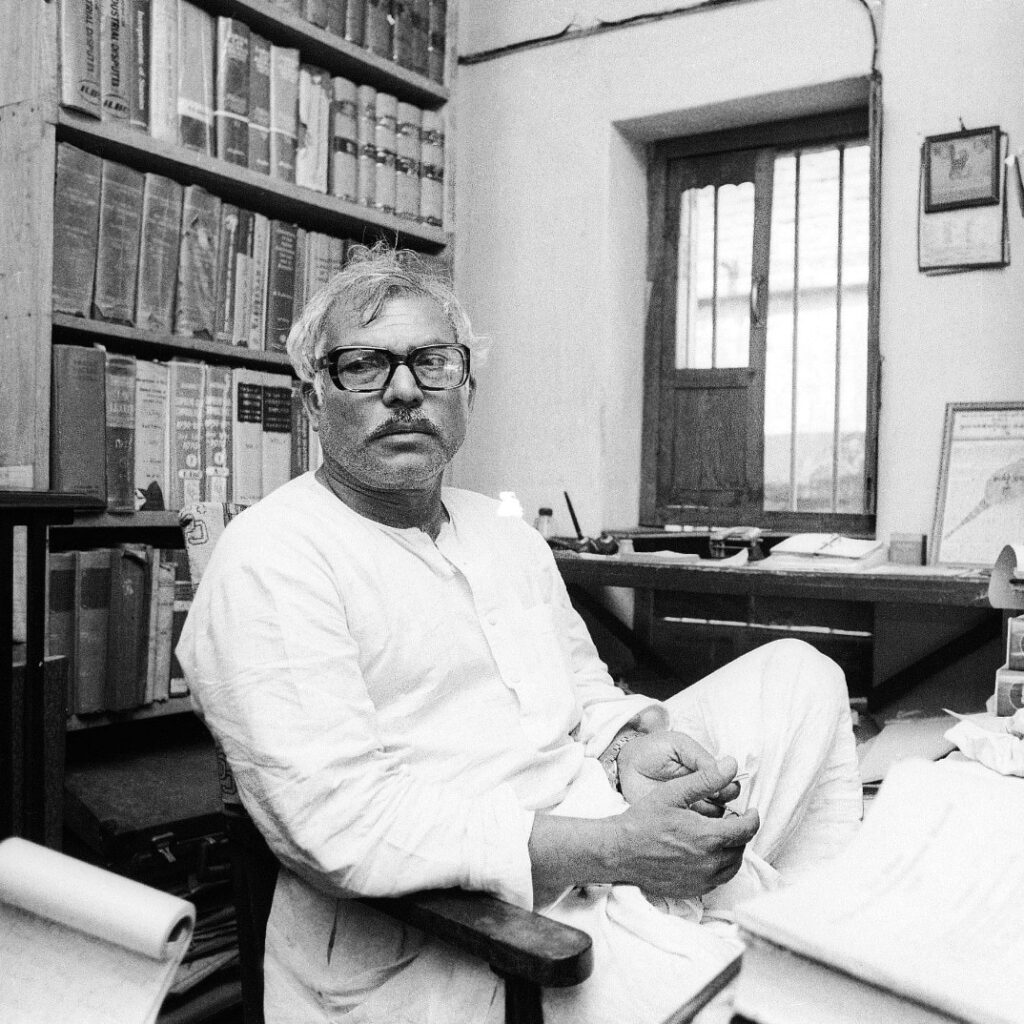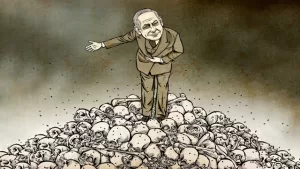Commemorating Jan Nayak Karpoori Thakur: Some Personal Family
Anecdotes
This week includes the birth centenaries of two of the most noble persons in India’s politics, who were renowned for their patriotism; selfless public service; integrity and ethics; intellect and erudition; cultured polite behaviour; and austerity and frugality.
Both were freedom fighters who were imprisoned by the British during the Quit India Movement in 1942, as were my father and mother.
Both were committed Socialists, who were among the most formidable adversaries of the Congress Party, and especially of Indira Gandhi.
Professor Madhu Dandavate, who was Railways Minister in the Janata Party government of Morarji Desai in 1977-1979, and Union Finance Minister in the Janata Dal government of Vishwanath Pratap Singh in 1989-1990, was born on 21 January 1924.
Jan Nayak Karpoori Thakur, social reformer and two time chief minister of Bihar, and whose acolytes include Nitish Kumar, Lalu Prasad Yadav, and Ram Vilas Paswan, was born on 24 January 1924.
My father HY Sharada Prasad, who was long time advisor to prime ministers of the Nehru-Gandhi family, and whose own birth centenary will fall on 15 April this year, had a very high regard for these two contemporaries of his, who were staunch opponents of the prime ministers whom he served.
In those days, there were many instances of bitter political rivals being close personal friends. It was an era of gracious behaviour in Indian politics.
Knowing of my family’s close association with Lok Nayak Jaya Prakash Narayan, another national leader whom we respected and admired greatly, but with whose politics we frequently disagreed, the eminent social scientist, Professor Anand Kumar, has done me the honour of asking me to write about the impressions my family members had about Jan Nayak Karpoori Thakur.
Professor Anand Kumar had earlier honoured me by asking me to deliver a lecture on Jaya Prakash Narayan and Jawaharlal Nehru, who were as close as to be virtually brothers, but whose politics diverged after 1948.
Both Professor Madhu Dandavate and Jan Nayak Karpoori Thakur were among the closest political disciples of Lok Nayak Jaya Prakash Narayan.
My article is not a hagiographic eulogy, as is customary on such occasions. Rather it is the sincere unvarnished opinions of someone who admired Karpoori Thakur for his myriad virtues, but who had serious reservations about many of his political and administrative policies.
Karpoori Thakur, who was born in a very poor rural family belonging to the Nai ( Barber ) caste, shot into the limelight as a fourteen year old schoolboy when Acharya Narendra Deva was addressing a national farmer’s conference near Karpoori’s village. The Acharya was highly impressed by the incisive questions asked by the young schoolboy, and invited him to join him on the dais, and then address the conference. The 14 year old’s brilliant speech captivated the middle aged farmers.
He asked a prominent zamindar for financial help to continue his studies. This zamindar ordered him to wash his dirty feet, and then rudely asked: “Why does a barber boy need to study?”
This insult made Karpoori Thakur determined to fight oppression by higher castes, and drove him to study the teachings of Ram Manohar Lohia.
Karpoori Thakur was jailed by the British from 1942 to 1945 ( as were my parents, student activists all across the country were exchanging ideas on how to counter the British ) for his participation in the Quit India Movement, when he was a prominent leader of the All India Students Federation.
While in jail, he joined the Congress Socialist Party, and became a follower of Ram Manohar Lohia and Jaya Prakash Narayan.
Although he was compelled to abandon his formal education due to being jailed, Karpoori Thakur was a voracious reader, with a keen interest in new ideas, especially on social and economic issues.
After working as a rural school teacher, he was elected to the Bihar legislature in 1952, where he propagated the ideals of Lohia and Jaya Prakash Narayan.
● ●
One anecdote narrated by my father HY Sharada Prasad is as follows:
In the 1967 parliamentary and state assembly elections, the Congress party suffered reverses. In Bihar state, a hastily cobbled anti-Congress coalition took office. Its parties ranged from right wing Hindutva to left wing socialists, who had nothing in common except their hatred for the Congress party.
Mahamaya Prasad Sinha became chief minister. Karpoori Thakur, leader of the Socialists, became deputy chief minister and education minister. He was by then one of Indira Gandhi’s most vehement critics.
Karpoori Thakur immediately abolished English as a compulsory subject for matriculation, instead promoting higher education in Hindi.
This coalition government tried to push through a law to make Urdu the second official language of Bihar.
In protest against the proposal to make Urdu the second official language, the RSS Rashtriya Swayamsevak Sangh, the Bharatiya Jana Sangh, a key constituent of the state government, and the Bihar Hindi Sahitya Sammelan instigated violent anti-Muslim riots in Ranchi between 22 and 29 August 1967.
What was especially shocking was that most of the violence was carried out by highly educated college teachers and high school principals and teachers, who killed many of their Muslim colleagues and students.
Indira Gandhi and my father flew to Bihar.
Even though the Bihar government detested Indira Gandhi, for reasons of protocol, chief minister Mahamaya Prasad Sinha, deputy chief minister Karpoori Thakur, and the rest of the Bihar cabinet had to receive her at the airport.
As soon as the ladder to the plane was set up, Karpoori Thakur broke ranks from the reception line, sprinted up the ladder, and banged hard on the aircraft doors. He demanded an urgent one to one meeting with Indira Gandhi.
She was freshening up in her cabin toilet.
From across the toilet door, Karpoori Thakur described to her how his own cabinet colleagues had instigated and financed the riots, and slipped a hand written document of evidence under the toilet door. “The very hands which will be greeting you with namastes in fifteen seconds are the very hands which are full of blood”.
Indira Gandhi, who had grown up in 1930s Europe, described to Karpoori Thakur how the RSS was emulating the play book of European fascists, of placing their members as school and college teachers so that they could influence the minds of future generations in favour of Hindutva.
Since he held the education portfolio, Karpoori Thakur tried hard to eradicate communal elements from Bihar’s schools and colleges.
The Justice Raghubar Dayal Commission detailed how prominent scholars and leading cultural figures, who owed allegiance to the RSS philosophy, killed their own Muslim students and colleagues.
This Commission placed the number of deaths as 164 Muslims and 19 Hindus, and the number of seriously injured as 103 Muslims and 53 Hindus. However the common consensus was that the dead numbered in the tens of thousands.
Ironically in March-April 1979, when Karpoori Thakur was the chief minister heading a Janata Party government, of which the erstwhile Bharatiya Jana Sangh was a major constituent with 68 MLAs, the RSS members in his own administration engineered anti-Muslim riots in Jamshedpur in order to discredit him.
The Justice Jitendra Narain Commission indicted legislators affiliated with the RSS for organising the riots, in which 79 Muslims and 25 Hindus were killed.
Aided by Jagjivan Ram and financed by liquor manufacturers, the erstwhile Bharatiya Jana Sangh members in his government, led by finance minister Kailashpati Mishra, forced Karpoori Thakur to resign as chief minister, in favour of a Dalit, Ram Sunder Das.
The OBCs Other Backward Castes, who were being promoted by Karpoori Thakur, had begun to persecute the only people who were lower than them on the social ladder – the Dalits. The Dalit leader Babu Jagjivan Ram swore to avenge Karpoori Thakur.
Karpoori Thakur had prohibited liquor, and so the liquor manufacturers sought revenge.
● ●
A second anecdote from my family is as follows:
On the night of 25-26 June 1975, Lok Nayak Jaya Prakash Narayan was arrested from the residence of my maternal uncle KS Radhakrishna, who was head of the Gandhi Peace Foundation.
About an hour later, Karpoori Thakur arrived at my uncle’s residence. The police moved to arrest him too, but my cousin KR Chandrahas convinced the police that Karpoori Thakur was the chowkidar (guard / caretaker) of the Gandhi Peace Foundation.
Karpoori Thakur indeed worked as the chowkidar of the Gandhi Peace Foundation for a short period, while clandestinely organising resistance against the Emergency.
An arrest warrant was issued against him under the Maintenance of Internal Security Act. In order to avoid endangering my cousin KR Chandrahas, Karpoori Thakur shifted to the Gandhi Smarak Nidhi opposite Raj Ghat, where he worked as its gardener.
Incredible as it may sound, two members of Indira Gandhi’s inner circle then enabled Karpoori Thakur to catch a flight to Kathmandu, where he stayed with a professor friend of his, SN Verma.
On most days Karpoori Thakur would cross the rivers separating Nepal and Bihar in the morning, spend the day organising resistance to the Emergency, and return to Nepal in the evening, again crossing the rivers.
Ram Vilas Paswan accompanied him on some occasions.
Once the police came very close to their jungle hideout. Karpoori Thakur and his companions began running away fast. He got so breathless that his companions thought he would die. They contemplated surrendering so that his life could be saved. Luckily he managed to hide in a thicket and recover.
Despite intense searches by the police, he was never caught during the entire tenure of the Emergency.
Karpoori Thakur’s elder son, Ram Nath Thakur, who is at present a Rajya Sabha member of parliament, was arrested during the Emergency. When he was released, he discovered that his mother and his wife were living in abject poverty, without having enough food to eat.
● ●
Another incident which I have heard about, but which I have not been able to verify, is as follows:
Karpoori Thakur’s second son, who was then a student, fell seriously ill. Indira Gandhi came to know, and got him admitted at Willingdon Hospital. She visited him a few times – she was personally gracious towards even her most vehement political adversaries. When his condition worsened, Indira Gandhi got him shifted to AIIMS. The doctors at AIIMS diagnosed him with a serious cardiac condition, and advised treatment in USA. Indira Gandhi offered to bear the expenses for the treatment in USA from the Prime Minister’s National Relief Fund.
Karpoori Thakur firmly stated that he would rather have his son die than allow public funds to be spent towards his medical treatment abroad.
I heard that Lok Nayak Jaya Prakash Narayan then raised funds for his treatment in New Zealand. The boy went on to become a medical doctor.
However, I have not been able to authenticate this incident. Perhaps the family members of Karpoori Thakur could corroborate this.
● ●
Numerous are the accounts of Karpoori Thakur’s incorruptibility and austerity.
When his wife fell ill and needed to be rushed to hospital, he refused to let her travel in the chief minister’s official vehicle. He insisted that she hail a cycle rickshaw from the street to go to a government hospital and await her turn to be examined by doctors.
When his sister’s husband asked him: “You are doling out jobs to so many people. Why don’t you give me a government job?”, Karpoori Thakur, who came from the Nai Barber caste, pulled out a fifty rupee note from his wallet, and replied: “Go buy some barber’s equipment, and start a barber shop”.
When a marriage proposal came for his daughter, and he wanted to visit the boy’s family, he refused to use his official chief minister’s vehicle, but instead walked to a taxi stand and engaged a cab.
For his daughter’s wedding, he refused to allow any guests or gifts.
The Bihar government had a scheme to allot plots of land at a prime location in Patna to legislators at a low cost. But he refused to avail of it. When he passed away in 1988, he did not own a house or car, and his ancestral house in his village was in shambles.
Even though he did not come from an intellectual lineage, and was compelled to abandon his education without obtaining a bachelors degree, Karpoori Thakur loved to interact with intellectuals and scholars, and was a voracious reader. The range of his reading spanned not only political and social issues, but also art, literature, history, and culture.
He interacted closely with internationally renowned political and social scientists such as Francine R Frankel ( who was also a good friend of my parents ), Susanne and Lloyd Rudolph ( close friends of Indira Gandhi and my father ), Paul Richard Brass, Harry W Blair, and Marcus Francis Franda, an expert on radicalisation in Bengal.
They in turn had a very high regard for him, with Paul Richard Brass rating him as one of the best politicians in the world. Brass wrote: “I loved and admired Lohia and Karpoori Thakur…They see politics as their vocation, pursue clearly stated goals, and do not enrich themselves in the process…”
When some foreign scholars came to Patna to meet him, Karpoori Thakur stated that this was not related wholly with his duties as chief minister, and so he could not utilise his official infrastructure for the meeting. He asked a friend to drop him at their hotel on his motorcycle.
When these foreign scholars saw him alight from the motorcycle pillion, to the cheering acclamation of the hotel staff, they remarked that they ‘could see why he was one of the most popular elected officials anywhere in the world, a true Jan Nayak’.
● ●
Coming to the legacies of Karpoori Thakur’s policies, he strongly believed that the principal function of government was to better the lot of the most disadvantaged and backward sections of society. And he worked tirelessly to achieve these noble aims.
He strove hard to prevent atrocities against Muslims and other minorities, Dalits, Harijans, and other backward and downtrodden castes and classes.
But the upper castes reacted vehemently to his proposals to provide Dalits and OBCs with arms and ammunition to defend themselves against atrocities.
His extreme reservation and affirmative action policies enabled millions of downtrodden people from the lowest castes to obtain education and government jobs, and guaranteed incomes.
But these came at enormous cost to the public exchequer, and merit suffered greatly.
However, his acolyte Lalu Prasad Yadav had articulated his priorities: “Vikas Nahin, Sammaan Chaahiyay” ( We want respect, not economic progress ).
With the benefit of fifty years of hindsight, I have some reservations about the consequences of Karpoori Thakur’s social engineering policies.
Since the education portfolio was under him, he admitted hundreds of thousands of extremely poor students from backward castes to schools and colleges.
He worked hard to eradicate communal elements and social discrimination from Bihar’s schools and colleges.
But educational standards fell drastically, and meritorious students migrated out of the state.
Previously, English was a compulsory subject for the matriculation examinations. Karpoori Thakur noted that most students from backward castes and rural areas failed in English. So even if they did well in other subjects, they were declared to be failed overall in the matriculation examinations, and so denied admission to universities and jobs.
His solution was to abolish English as a compulsory subject for matriculation.
However, this resulted in Bihari students being unable to compete successfully at the national level.
Corporations refused to hire what they derisively referred to as ‘Karpoori graduates’.
He threatened to punish officers who used English in administrative work, and got rid of English typewriters in government offices.
One of the biggest problems when Karpoori Thakur took office was that several thousands of engineering and medical graduates were unemployed, and they launched a long agitation demanding permanent jobs from the state government.
So he doled out hundreds of thousands of government jobs to these unemployed engineering and medical graduates. Never mind that there was not sufficient work for them. Nor that they were not competent enough to perform these tasks. In one instance, he appointed eight thousand fresh engineering graduates in one hour.
He doled out government contracts to unemployed engineering graduates, who lacked the expertise and experience to execute them properly. As a result, infrastructure deteriorated.
One of the unintended consequences of his empowering OBC Other Backward Castes was that they began to oppress the only persons who were below them in the social hierarchy – the Dalits.
In my opinion, Karpoori Thakur underestimated the backlash he would encounter from Bhumihars, Rajputs, and Brahmins, who strongly resisted his efforts to uplift Dalits, Yadavs, Kurmis, Koeris, and other lower castes.
In his hurry to implement his social engineering schemes, he did not first neutralise the powerful entrenched interests of the upper castes. Devaraj Urs, who was chief minister of Karnataka, remarked to the eminent political scientist James Manor, who was close to my father: “Karpoori Thakur jumped into the boxing ring without first learning how to box”.
I also think that Karpoori Thakur underestimated the power of the RSS, who sabotaged him from within his government, and instigated communal riots to discredit him. Unfortunately, in their hatred for the Congress party, the Socialists had allied with the Bharatiya Jana Sangh in the 1960s in Uttar Pradesh and Bihar, not realising that the RSS was more insidious.
Karpoori Thakur’s prohibition of alcohol won him the gratitude – and votes – of women suffering from alcoholic abusive husbands, but deprived the exchequer of major revenues. The manufacturers of alcohol took their revenge by financing his overthrow in April 1979.
Karpoori Thakur’s political heirs include Lalu Prasad Yadav, Nitish Kumar, and Ram Vilas Paswan. However, Lalu Prasad Yadav had dubbed him as Kapati ( Wily Fox / Deceitful ) Thakur.
On his birth centenary, it would be instructive to examine the long-term impact of Karpoori Thakur’s policies, thirty six years after his premature demise. Several political parties have called for enhancing the Karpoori Thakur formula on reservations. There have been calls that he should be awarded the Bharat Ratna.
Social justice, reservations, and affirmative actions should be balanced with merit, fiscal responsibility to the exchequer, and economic development. Tamil Nadu and Karnataka empowered lower castes without adversely affecting economic development.
In the early 1950s, the eminent expert on public governance, Paul Henson Appleby, had mentioned to Jawaharlal Nehru that Bihar was the best governed state in India. This statement received wide publicity, although it does not appear explicitly in any of Appleby’s official reports. But Bihar was then one of the most preferred cadres for IAS and IPS officers.
However, Bihar became a byword for backwardness, lawlessness, and corruption, and the acronym BIMARU was coined for the four major states of the Hindi belt.
In my assessments, it is unfortunate that Karpoori Thakur was born twenty to thirty years too late. If he had been in power in Bihar at the time of Independence, the social structure of the cow belt would have been much more equitable today.
(Ravi Visvesvaraya Sharada Prasad, an alumnus of Carnegie Mellon University and Indian Institute of Technology, Kanpur, is a high technology consultant and defence analyst.)




